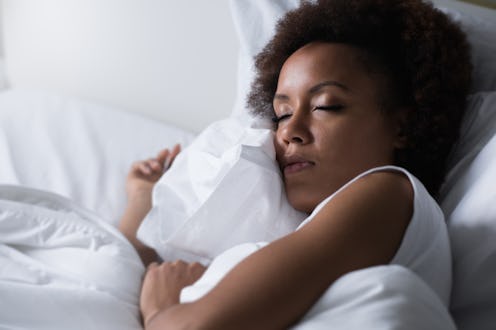Life
Here’s How Dry January Impacts Your Sleep — And The Effects Last A Long Time

If you're thinking about setting goals for the New Year, drinking less alcohol might be on your mind. That's the premise for Dry January, anyway — the annual post-New Year’s event where folks take a month-long break from boozy beverage. Now, a new study looking at last year's Dry January participants says that people reported better sleep, more energy, and saving money after a month of not drinking, with results lasting well into the fall.
“The simple act of taking a month off alcohol helps people drink less in the long term: By August people are reporting one extra dry day per week,” said Dr. Richard de Visser in a press release about the University of Sussex study. “There are also considerable immediate benefits: Nine in 10 people save money, [and] seven in 10 sleep better.”
"Interestingly, these changes in alcohol consumption have also been seen in the participants who didn't manage to stay alcohol-free for the whole month — although they are a bit smaller. This shows that there are real benefits to just trying to complete Dry January,” Dr. de Vesser said.
Refinery29 reports that more than three million people took part in Dry January in the UK at the start of 2018, while similar stats are expected for 2019. A recent YouGov poll issued by Alcohol Change UK, the organization that founded Dry January in 2012, says that an estimated 4.2 million people in the UK say that they intend to do Dry January in 2019, according to a press release.
According to the University of Sussex’s press release, “Drinking days fell … from 4.3 to 3.3 per week; units consumed per drinking day dropped on average from 8.6 to 7.1; frequency of being drunk dropped from 3.4 per month to 2.1 per month on average.” The research further shows that 93 percent of participants had a sense of achievement upon completing Dry January, while 88 percent saved money. Additionally, participants reported learning more about their personal drinking habits, including when and why they drink, 57 percent had better concentration, 71 percent reported better sleep, and 70 percent noted better overall health.
“The brilliant thing about Dry January is that it’s not really about January,” Dr. Richard Piper, CEO of Alcohol Change UK said in the University of Sussex press release. “Being alcohol-free for 31 days shows us that we don’t need alcohol to have fun, to relax, to socialise [sic]. That means that for the rest of the year we are better able to make decisions about our drinking, and to avoid slipping into drinking more than we really want to.”
Like Dr. Piper said, these benefits don't have to do just with Dry January. Alcohol is notorious for messing with your sleep: "While alcohol, a depressant, can help you fall asleep faster, it also contributes to poor quality sleep later," the National Sleep Foundation wrote. A review from 2005 found that just one drink can impair your breathing during your sleep, impacting your sleep quality overall.
If you want to take a break from your weekly cocktail hour and take part, if for a month or longer, it definitely won't hurt your health — and it might just improve it. You can download Try Dry: The Dry January app to track your progress and dollars saved. And who knows, you might just get a spike in energy and some deeper zzz’s to boot.